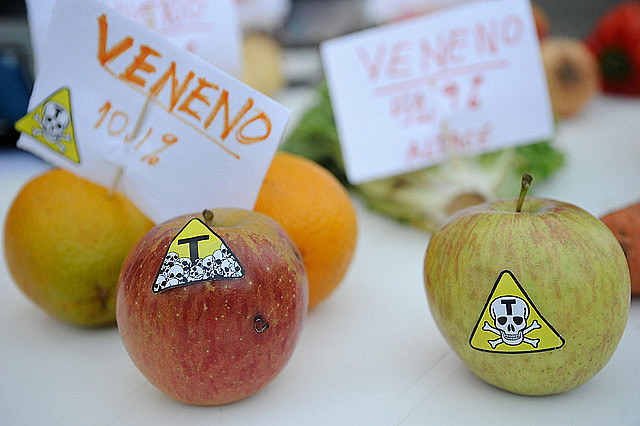A special committee voted on Monday to approve a report recommending Brazil’s Chamber of Deputies pass a bill dubbed the “Poison Bill,” which relaxes the rules to introduce new agrochemicals in the country.
Eighteen members of the special committee voted to approve congressman Luiz Nishimori’s report, while nine voted against it.
As the bill was referred to a special committee, other committees are not required to review it, and now the bill can be placed on the house calendar. If passed on Brazil’s lower house, the bill will be sent to the Senate before it is sent to the president to sign into law.
The bill is in the interest of corporate farming and is pushed through as a way to “modernize agriculture.” Congressman Valdir Colatto advocates for relaxing the rules to approve new chemicals. “Brazil doesn’t have money to invest in research. We have to use research from other countries,” he said.
Alessandro Molon, one of the members of Congress opposing the bill, questioned this idea. “They are putting profit before Brazilians' health. Why don’t they write down in the report that chemicals that cause cancer are banned?”
Brazilian research institutions criticized the bill, arguing agrochemicals are linked to cancer. The Federal Prosecution Service also questioned whether the bill is constitutional, as it establishes that states and cities could not pass laws that are more restrictive than the federal law.
More than 200 civil society organizations released a manifesto against the bill, while a poll on the Chamber of Deputies website shows 90 per cent of voters do not approve the proposed legislation changes.
During the sessions, members from opposition parties requested several times that research institutions should be heard by the special committee, but members who represent the agribusiness lobby, the majority of the committee, rejected all requests.
Backlash
Researchers from different fields criticized the advancement of the “Poison Bill” and pointed out agrochemicals pose grave risk to the environment and human health. The experts were participating in a hearing at another special committee that is debating a bill known as the National Policy for Reducing Agrochemical Use (PNARA).
Marcia Sarpa, a researcher at Brazil’s National Cancer Institute, said scientific evidence from Brazilian and foreign studies shows that contact with agrochemicals increases the risk of cancer.
She also countered arguments of supporters of the “Poison Bill,” who claim there are safe and unsafe ways to use these toxic substances.
“You can’t set a limit for safe exposure. These risks are real. Exposure to one single molecule of these chemicals can be harmful. There is no safe limit for these mutagens, carcinogens, or teratogens,” she said.
Larissa Bombardi, a Geography professor at the University of São Paulo, spoke about why Brazil is such a large agrochemical consuming country. The key point, she argued, is the economic model. Up until the 1980s, Brazil exported more manufactured goods, but agribusiness has been gaining more prominence in recent decades.
“We are not just the top agrochemical consuming country – we buy 20 per cent of all of the world’s pesticides. From 2000 to 2014, this figure has more than doubled. Since the 2000s, we went back to a pattern of exporting more primary products than manufactured goods,” she explained.
The scholar presented alarming figures: 30 per cent of the pesticides approved in Brazil are banned in Europe. Every day, there are eight reported cases of pesticide poisoning in the country.
*With reporting by Rafael Tatemoto




